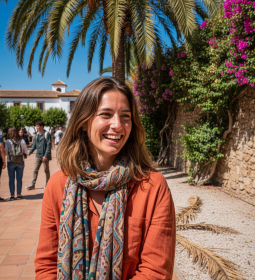In most countries, they are used to the fact that higher education is very serious. However, you can find courses at universities and colleges in the UK or the USA, where you can find a bachelor's degree in the study of Elvish, the economy of Westeros and dozens of other, no less bizarre options!
Today we will talk about some of these programs. At first glance, their names may seem like a provocation (and at the second glance, everything is true — some universities and teachers attract attention to themselves in this way: the most unusual courses can get into an advertising booklet or a review on popular academic portals), but the content is invariably serious.
Witchcraft and the Occult
Harry Potter has matured, and as we know from the words of his girlfriend Hermione Granger, there are no higher educational institutions in the wizarding world. The University of Exeter decided to correct this shortcoming and in 2024 opened enrollment for master's programs in the field of witchcraft and the occult!
This step seems quite natural, because a specialized Center for the Study of Magic and Occult Studies has been operating in Exeter for three decades. Of course, they do not teach conjuring there, but they pay close attention to the relationship between different cultures and religions and esoteric practices.

The program is no stranger to DEI. One of the goals stated at the opening of the program was to change the attitude towards traditional oriental cultures. Teachers are working hard to debunk the myth that magic and the occult are the lot of Eastern and African peoples, while in the "white" West everything revolved around modern scientific knowledge. So a wide range of disciplines are studied here, from the natural philosophy and sociology to history and archaeology; within the framework of additional modules, you can engage, for example, in draconology or research on nutritional, pedagogical or sexual practices of the Middle Ages.
Superheroes
Harvard , in collaboration with the Smithsonian Institution, decided to focus on contemporary popular culture and launched a digital course where, under the guidance of Professor Robishaw from Harvard, students are introduced to philosophy, ethics, and sociology from a specific point of view — through the prism of characters from well-known comic books.
Interestingly, "superheroes" can teach not only psychology and philosophy, but even physiology. For example, at the Ohio University College of Medicine, junior students study human anatomy and physiology through the example of superheroes - it is believed that in this way the subject will become more interesting and exciting.
Perhaps it is! If we read the students' reviews, we can easily make sure that they are satisfied and successful, and are happy to discuss how to diagnose certain diseases of Mr. Hyde or how Wolverine's claws affect the structure of his skeleton.

Kitchen Sciences
Harvard's attractions are not limited to superheroes and their moral and ethical attitudes: in total, students are offered several thousand of the most diverse and amazing courses. One of them is dedicated to the relationship between science and cooking.
As part of this conceptual course, starting from a basic understanding of physics and chemistry, experienced masters of culinary art talk about how they create their masterpieces, after which teachers explain why and how these dishes are obtained — from a scientific point of view, how the whole thing happens. For example, how the molecules of a particular substance affect the organoleptic properties of dishes, on what principle fermentation occurs, how gastric juice decomposes the whole thing.
According to the authors of the program, after its compliting, the students will be two in one - both to train masters and to achieve some progress in terms of the scientific craft.
For those who want to make friends with spiders
The London Zoo, with the support of one of the city's universities, has developed a special (and quite useful) course designed for those who are at odds with spiders - suffer from arachnophobia and are afraid of these furry creatures with a set of charming eyes and long legs. The course is very short, only four hours, but involves both theoretical and practical components. First, the zookeepers talk about their wards, and then the latter will have a hypnosis session from a specialist. Those who then find enough courage to face their fear in person will have a date with spiderlings (of course, not dangerous!).
The course is quite expensive, but there are almost never any places, so you need to book in advance. Also, the schedule of spiders should be taken into account: by winter, they either hide and hibernate, or die, having previously laid eggs and ensured the continuation of the species.

Learn to speak Klingon
A teacher from Ohio University has developed her own sign language, which is based on the body movement of one of the species of crustaceans, the mantis shrimp. But in her classes, she teaches students Elvish, Dothraki, Klingon, and other fictional languages that exist within popular movie or literary universes!
At seminars and lectures, students read, write texts and even make translations "back and forth"; At first glance, it seems like a kind of delusion, but the first impression is often deceptive. The same is true here: by studying synthetic languages, people often make significant progress in mastering the principles and laws of linguistics as such, learning to understand the structure of language, the principles and laws by which it exists. Some graduates of this course have already made a name for themselves in the film industry and invented their own languages — for example, this is how several dialects of the Star Wars universe appeared, the Twi'lek language, for example.
Learning to be idle
Kenneth Goldsmith, a well-known poet who teaches at the University of Pennsylvania, in 2015 presented to the general public his author's course entitled "How to waste your time on the Internet". Behind this provocative title is a bold literary experiment: students had to communicate with each other for several hours on the World Wide Web, and based on the results, write a short story, play or poem.
However, the first pancake turned out to be lumpy: instead of several hours of productive communication, bored young people watched memes or clips on the Internet.

Then Kenny, as students call the innovator, rethought the program, turning the network into a way and tool for a collective challenge to the norms of morality and ethics. Now, instead of correspondence, students played computer games or tag, hid in the university building or watched films, and this was supposed to be done with the sound turned on at maximum, in the presence of other students and teachers...
The point of this specific experiment was to provide students with a specific experience: the teacher is sure that this is exactly what is needed to create literary works.
Today, it will no longer be possible to sign up for the course - it was canceled after the second year due to polar reviews: some students believed that this was a brilliant and very cool idea, others were extremely dissatisfied. One way or another, Kenneth Goldsmith has already taken a place in the history of the American Academy!









